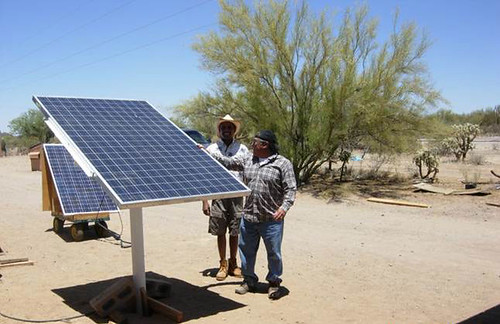
This post is part of the Science Tuesday feature series on the USDA blog. Check back each week as we showcase stories and news from USDA's rich science and research portfolio.
A man in Arizona threw away an extension cord – and that’s a big deal for some folks who live about 100 miles west of Tucson.
The 48 families who live in the Pisinemo District of the Tohono O’odham Nation reside in an area so remote that some had to get their power by stringing extension cords to a neighbor’s house. Now, however, they have new solar panels to provide electricity for heating, cooling, and cooking.
Residents of the district are now using the power of the sun, thanks to Tohono O’odham Community College (TOCC) and its partner, the University of Massachusetts–Lowell. Using a grant from the U.S. Department of Agriculture’s National Institute of Food and Agriculture (NIFA), the two schools gave 25 TOCC occupational technology students on-the-job training in solar panel installation – one home has a freestanding power system while others are tied-in to a grid.
“This pilot project creates a model for bringing renewable energy to businesses – in this case ranching – and to homes in remote, rural communities,” said Dr. Teresa Newberry, project director for TOCC.
TOCC’s program is in response to a request from local community leaders who want to explore power sources that may help them supplement – or replace – the commercial utility grid. Five homes have received the upgrade so far, and they hope to continue with additional funding. In addition to homes benefitting from solar power, farmers have been able to restart an irrigation system that dried up when the old-fashioned windmill broke down.

This project was funded under NIFA’s Tribal Colleges Research Grants Program, which builds institutional research capacity at the 1994 land-grant institutions and also funds projects to enhance student research skills. Research funded under this grant typically address community, reservation, or regional challenges.
Through federal funding and leadership for research, education, and Cooperative Extension programs, NIFA focuses on investing in science and solving critical issues impacting people's daily lives and the nation's future.

